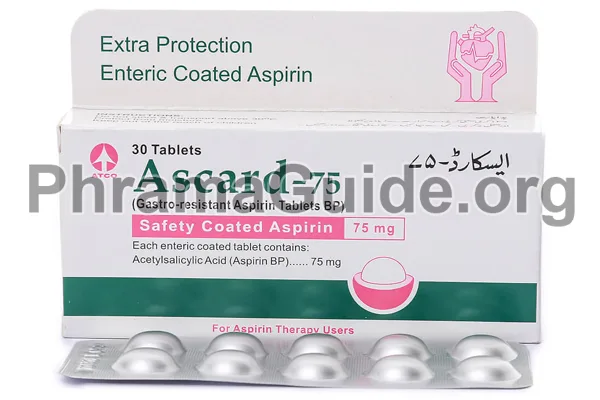Ascard tablet is used to prevent cardiovascular issues and to relieve mild to moderate pain and inflammation. It provides blood-thinning effects that prevent blood clotting and reduce the risk of deep vein thrombosis, stroke, and heart attacks. Following are some common and off-label uses of Ascard tablets:
Common Uses of Ascard Tablet
- Heart Attack Prevention: Ascard is used as a preventative measure to reduce the risk of heart attack in people who have already had a heart attack, or other cardiovascular issues.
- Stroke Prevention: Ascard tablet is also used to reduce the risk of ischemic strokes (those caused by blood clots) in individuals at high risk, such as those who have already had a stroke or transient ischemic attack (TIA).
- Prevention of Blood Clots: Ascard is used to prevent blood clots, which can reduce the risk of heart attack, stroke, and other cardiovascular conditions in people who are at high risk.
- Antiplatelet Effect: Ascard tablet can be used to prevent blood clot formation in certain medical procedures, such as coronary artery bypass graft (CABG) surgery, stent placement, or carotid endarterectomy.
- Pain Relief: Ascard tablet is also used to relieve mild to moderate pain, such as headache, toothache, menstrual cramps, and joint pain.
- Fever Reduction: Ascard tablet is effective in lowering fever in cases of fever due to infections or other causes. It helps by acting on the part of the brain that controls body temperature.
- Anti-Inflammatory: Ascard tablet has anti-inflammatory properties and can reduce inflammation in conditions like arthritis and other inflammatory diseases. It is often used for pain and inflammation associated with conditions like osteoarthritis and rheumatoid arthritis.
Off-label Uses of Ascard tablet
- Pre-eclampsia and Eclampsia Prevention: Ascard tablets may be used in some cases to help prevent pre-eclampsia and eclampsia in pregnant individuals at high risk for these conditions.
- Cancer Prevention: Ascard tablets may be used off-label to reduce the risk of certain types of cancer, particularly colorectal cancer.
- Alzheimer’s Disease Prevention: Ascard tablets may be used to reduce the risk of Alzheimer’s disease.
- Diabetes Management: Ascard tablets may be considered in some cases as part of a treatment plan for individuals with diabetes, particularly those at higher risk for cardiovascular events.
- Migraine Treatment: In addition to migraine prevention, Ascard tablets may be used off-label for acute migraine treatment in some cases.
- Polycystic Ovary Syndrome (PCOS): Ascard tablets may be considered as part of the treatment plan for individuals with PCOS, particularly for those with insulin resistance.
- Idiopathic Intracranial Hypertension (IIH): Ascard tablets may be used in some cases as part of the treatment for IIH, a condition characterized by increased pressure in the skull.
- Chronic Kidney Disease (CKD): Ascard tablets may be considered as part of the treatment plan for individuals with CKD, particularly for those at higher risk for cardiovascular events.

What is Ascard?
Ascard is one of the leading brands of Aspirin, manufactured and marketed by Atco laboratories, Pakistan.
Ascard Alternatives : Other Similar Brands
The following are some alternative brands of Ascard and their manufacturers.
- Disprin : Reckitt Benckiser (Pvt) Ltd.
- Loprin : Highnoon Laboratories, Pakistan.
- Aspro : Reckitt Benckiser, Pakistan.
- Doloprin : Pacific Pharmaceuticals, Pakistan.
- Aspicot : Scotmann Pharmaceuticals, Pakistan.
- Aspidis : Zafa Pharmaceuticals, Pakistan.
- Asrin : Star Laboratories (Pvt) Ltd, Pakistan.
- Bloprin : Bloom Pharmaceuticals, Pakistan.
- Caspia : Epla Laboratories, Pakistan.
- Diprin : Genome Pharmaceuticals, Pakistan.
Ascard : Available Formulations and Strengths
Presently, Ascard is available in Tablets form
Ascard Tablets : 75mg, 150mg, and 300mg strengths
Who Should Not Use Ascard?
The uses of Ascard tablet can be beneficial for many people, but it is not suitable for everyone. Here are some of the contraindications, for which Ascard should not be used:
- Allergy or hypersensitivity: Ascard tablets should not be used by people who are allergic to Aspirin (an active ingredient Ascard tablet) or other nonsteroidal anti-inflammatory drugs (NSAIDs).
- Bleeding disorders: Ascard can increase the risk of bleeding, so it should not be used by people with bleeding disorders, such as hemophilia.
- Active peptic ulcer disease: Ascard tablets can increase the risk of stomach ulcers and bleeding, so it should not be used by people with active peptic ulcer disease.
- Severe liver or kidney disease: Ascard can be harmful to people with severe liver or kidney disease, so it should be used with caution or avoided altogether in these cases.
- Children and teenagers: Ascard tablets should not be used in children and teenagers who have a viral illness, such as the flu, due to the risk of Reye’s syndrome.
- Pregnancy and breastfeeding: Ascard tablets should not be used during pregnancy or breastfeeding without the advice of a healthcare professional.
What is the Recommended Daily Dosage of Ascard Tablet?
It is recommended to take an Ascard tablet after meals.
Adults Dose of Ascard for Pain Relief:
- 1-2 tablets of 300mg every 4-6 hours as needed with food or milk.
- The maximum daily dose of Ascard is 4gm (4,000mg).
Ascard Dose for Reduce the Risk of Heart Attack or Stroke:
- one tablet of 75mg to one tablet of 300mg, or as directed by their healthcare provider.
How Ascard Works?
Aspirin (An active ingredient of Ascard Tablets), also known as acetylsalicylic acid, is a non-steroidal anti-inflammatory drug (NSAID). Ascard works by inhibiting the activity of an enzyme called cyclooxygenase (COX), which is responsible for the production of prostaglandins (hormone-like substances) that are involved in inflammation, pain, and fever.
Specifically, Ascard irreversibly acetylates and blocks the active site of COX-1 and COX-2 enzymes, leading to a decrease in prostaglandin synthesis.

Leave A Comment